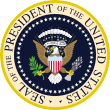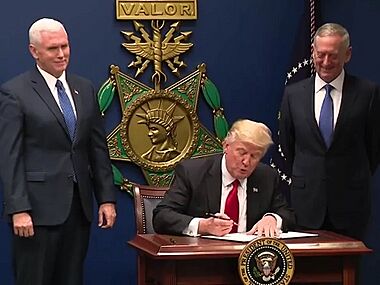Executive Order 13769 facts for kids
| Protecting the Nation from Foreign Terrorist Entry into the United States | |
 |
|

U.S. President Donald Trump signing the order at the Pentagon, with Vice President Mike Pence (left) and Secretary of Defense Jim Mattis
|
|
|
Executive Order 13769 in the Federal Register
|
|
| Type | Executive order |
|---|---|
| Executive Order number | 13769 |
| Signed by | Donald Trump on January 27, 2017 |
| Federal Register details | |
| Publication date | {{#property:P577}} |
| Document citation | {{#property:P1031}} |
| Summary | |
* Not in force as of 3 February 2017[update]
|
|

Executive Order 13769 was a special rule made by President Donald Trump. It was officially called Protecting the Nation from Foreign Terrorist Entry into the United States. Many people also called it the Trump travel ban or the Muslim ban.
This order was in effect from January 27, 2017, to March 6, 2017. It was later replaced by a new order, Executive Order 13780.
The order aimed to lower the number of refugees allowed into the United States. It stopped the U.S. Refugee Admissions Program (USRAP) for 120 days. It also stopped people from certain countries from entering the U.S. for 90 days. These countries were Iran, Libya, Somalia, Sudan, Syria, and Yemen. Iraq was also on the list at first, but it was later removed.
Many people protested against the order. There were also several court cases trying to stop it. Critics called it a "Muslim ban" because most people in the affected countries were Muslim. Also, President Trump had previously talked about banning Muslims from entering the U.S.
On February 3, 2017, a judge stopped parts of the order across the country. This decision was supported by another court on February 9, 2017. Because of this, the government stopped enforcing some parts of the order. Later, other orders replaced Executive Order 13769. In 2018, the U.S. Supreme Court said the third version of the travel ban was legal.
On January 20, 2021, President Joe Biden canceled this travel ban and related orders.
What the Order Said
The official version of the order had several key parts.
Section 1 talked about the purpose of the order. It mentioned the September 11 attacks. It suggested that past rules made it hard to check people applying for visas. However, none of the September 11 attackers were from the seven countries listed in the order.
The order did not include some Muslim-majority countries where the Trump Organization had done business. This led some people to suggest that business interests might have influenced the decision.
Rules for Visitors, Immigrants, and Refugees
Section 3 of the order stopped people from Iran, Iraq, Libya, Somalia, Sudan, Syria, and Yemen from entering the U.S. for at least 90 days. This included people with valid visas. This rule affected about 218 million people from these countries.
The order also said that the government would review countries to see if they shared enough information. If a country did not share enough information, its citizens could be banned from entering the U.S.
Section 5 stopped the United States Refugee Admissions Program (USRAP) for at least 120 days. It also stopped Syrian refugees from entering indefinitely. The number of new refugees allowed in 2017 was lowered to 50,000. After the program restarted, refugees who were being persecuted for their religion (if they were a minority religion in their country) would be given priority.
The order allowed for exceptions in special cases. Section 7 called for a faster way to set up a biometric entry/exit tracking system. This system would use things like fingerprints to track all travelers entering and leaving the U.S.
Officials also thought about asking refugees and visa applicants for their social media passwords. This was part of a plan to make security checks stronger.
Green-Card Holders
There was some confusion about whether people with green cards (who are allowed to live and work permanently in the U.S.) were affected. At first, the government said green-card holders from the affected countries were banned. But later, they changed this rule.
By January 29, 2017, the Secretary of Homeland Security said that green-card holders could enter the U.S. because it was "in the national interest." This meant they were exempt from the ban.
Dual Citizens
There was also confusion about people who were citizens of two countries (dual citizens). For example, someone who was a citizen of Iran and Canada. At first, the government said these people would not be allowed in if one of their citizenships was from a banned country.
However, the rules were later updated. On January 31, 2017, the government said that dual citizens could enter the U.S. if they had a U.S. visa and used a passport from a country not on the banned list.
Screening All Entrants
Section 4 of the order called for a new, standard way to screen people applying to enter the U.S. This screening would help identify anyone who might want to harm the U.S. or its people.
One idea was to check social media accounts of people applying for visas. This was to make sure they did not have violent or hateful ideas. Some officials even suggested asking for social media passwords and financial records.
Impact of the Order
Terrorism
President Trump said the order was to prevent terrorism. However, a study in 2021 found that the refugee ban did not change crime rates.
At Airports
Right after the order was signed on January 27, 2017, airport officials started enforcing the new rules. People with valid visas, including students and green-card holders, were stopped from entering or sent back. Some people were stuck in other countries while traveling.
Many people already on planes to the U.S. were held when they arrived. The American Civil Liberties Union (ACLU) estimated that 100 to 200 people were held at U.S. airports. Hundreds more were stopped from getting on flights to the U.S.
Lawyers offered free help to travelers. The Department of Homeland Security (DHS) said that the order affected less than 1% of air travelers. By January 29, DHS said 375 travelers were affected. There were also reports of border agents asking for access to travelers' social media accounts.
Later, the government said that over 100,000 visas had been canceled because of the order. However, this number was later corrected to fewer than 60,000.
Number of People Affected
On January 30, President Trump tweeted that only 109 people were held. But officials later said this number was just for the first few hours. By January 31, Customs and Border Protection (CBP) reported that 721 people were held or stopped from boarding flights.
The order affected many more people than just those held at airports. Many people who had visas or green cards were worried they could not travel. In 2015, about 60,000 U.S. visas were given to people from the seven affected countries.
Before the order, the U.S. allowed about 1,800 refugees per week from these countries. While the order was in effect, only two refugees from those countries were allowed in.
Impact on U.S. Businesses
Companies like Google told their employees from affected countries to return to the U.S. quickly. This was in case the order stopped them from coming back. About 100 Google employees were affected.
Other companies, like Amazon and Expedia, said the order caused problems for their employees and customers. They supported lawsuits against the order.
Some experts thought the order would not greatly change hiring in U.S. tech companies. However, others worried it would hurt U.S. tourism and business. The U.S. tourism industry saw a "Trump Slump." Fewer tourists came to the U.S., and business travel dropped. For example, Los Angeles County could lose 800,000 visitors, which means less money from tourism.
Travelers and Patients
The order caused a lot of worry for citizens of the affected countries. People outside the U.S. feared they would not be allowed in. Those already in the U.S. worried they could not leave and return.
Some believed the order could lead to a shortage of doctors in the U.S. About 5% of foreign-trained doctors in the U.S. came from the seven countries. These doctors often work in rural areas that need them most.
Impact on Education
Many universities were affected by the travel ban. For example, Bennington College had many international students, and some could not return. Future students from these countries also faced problems.
Universities like New York University kept their students updated. They worried that President Trump's views on immigration would make fewer international students want to study in the U.S.
Students with F1 visas (for studying) were also at risk. These visas often allow only one entry into the U.S. This meant students might not be able to visit their families for school breaks if they could not re-enter the country.
Timeline
| Year | Month | Day | Events | Details |
|---|---|---|---|---|
| 2017 | 01 | 27 | Order is signed | |
| 2017 | 01 | 28 | Two travelers are released | After the ban started, two people were released from airport custody. |
| 2017 | 01 | 29 | Judge blocks deportations | A New York judge agreed to stop deportations for people stuck at airports. |
| 2017 | 03 | 06 | A new executive order is signed | People with green cards and visas were no longer affected. Iraq was removed from the list of countries. See Executive Order 13780 for more. |
| 2017 | 07 | 19 | Supreme Court allows some relatives to enter | This included grandparents, grandchildren, aunts, and uncles of people in the U.S. |
| 2018 | 06 | 26 | Supreme Court supports the third version of the order. |
Order Changes and Replacement
In February 2017, reports said the White House was trying to rewrite the order. This was to make it stronger against legal challenges. A new executive order was planned to address concerns about the first one.
The new order would focus on the same seven countries, but without Iraq. It would also not apply to people with green cards or valid visas. The indefinite ban on Syrian refugees would also be changed to a 120-day suspension, like for other countries.
A rewritten executive order was signed on March 6, 2017. This new order removed Iraq from the list. It also did not apply to green-card holders or anyone with a valid visa already in the U.S. The new order also added a way for people to ask for special permission to enter, which was not in the first order.
On March 15, 2017, a judge in Hawaii stopped the new order from taking effect. The judge said it seemed like a "Muslim ban." President Trump disagreed with the ruling and said it would be appealed.
On June 26, 2017, the Supreme Court allowed key parts of the order to go into effect. They also decided to hear full arguments about the case later that year.
See also
- Trump v. Hawaii
- 2017 electronics ban
- Muslim immigration ban
- Day Without Immigrants 2017
- List of executive actions by Donald Trump
- Protests against Donald Trump
- Refugees of the Syrian Civil War
- United States Citizenship and Immigration Services
- Visa policy of the United States
 | Selma Burke |
 | Pauline Powell Burns |
 | Frederick J. Brown |
 | Robert Blackburn |


